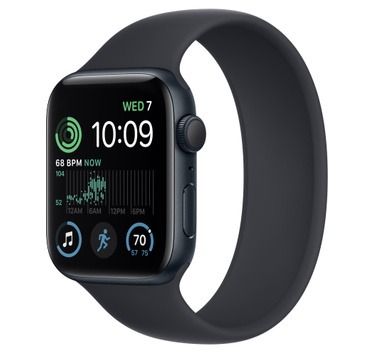Instant messaging has revolutionized the way the world works. Most of us got our first spin with it during the height of MSN Messenger from its launch in 1999. Now the rise of smartphones has changed the way instant messaging works again. However, there’s not a single, one-size-fits-all solution for messaging just yet. There are several options out there for instant messaging, but sometimes it’s not even our decision, but rather, we have to use whatever our friends and family use. Nonetheless, among apps, keyboards, and more, a decent messaging service should be in order as well. From widely-used options to privacy-focused ones, there’s something for everyone here.
Navigate this guide:
- Best Overall Messaging app: WhatsApp Messenger
- Best Android-focused Messaging app: Google Messages
- Best Messaging App for Apple Devices: iMessage
- Best Messaging app for Features: Telegram
- Best Messaging for Privacy: Signal
- Best Messaging App for Socials Integration: Facebook Messenger
- Best Messaging App for Groups and Communities: Discord
- Best Messaging App for Businesses: Slack
- Honorable Mention: Google Chat
Best Overall Messaging app: WhatsApp Messenger
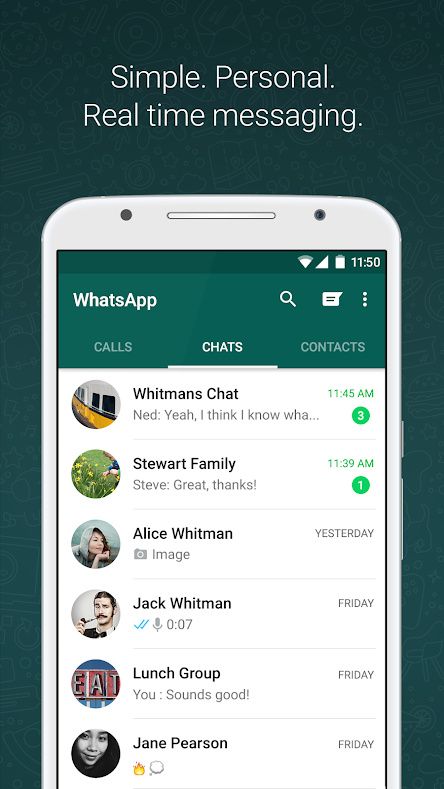
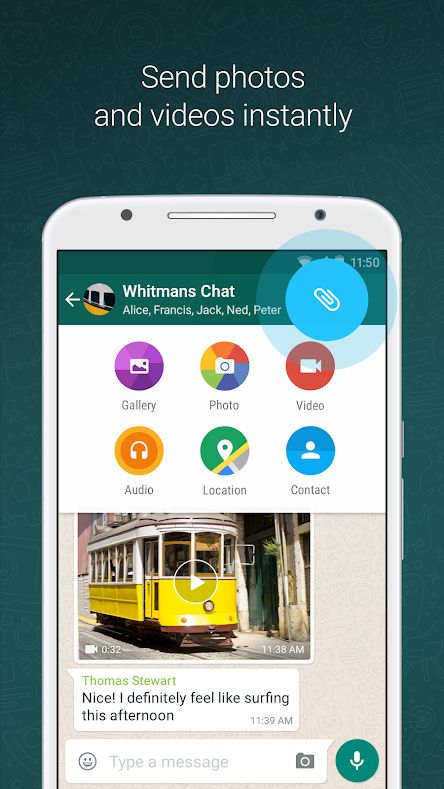

Ah, WhatsApp. It might not be as feature-packed as other instant messaging apps or have the cleanest track record when it comes to privacy or communication around privacy. But there’s a compelling argument as to why most of us use it anyway — everyone else uses it, and we’re kind of stuck with it. That’s because of its absolutely massive user base — over 2.5 billion active worldwide users. Given there are roughly 7.5 billion people on Earth, that means a third of the world uses WhatsApp. Depending on where you live, you probably have an absolute majority of your friends and family using it as well. While several other IM apps offer a lot more functionality, and WhatsApp is quite slow to integrate new features, WhatsApp has the biggest draw of an IM app: a large and active user base, making it near-omnipresent and consequently indispensable.
Even when taking out the user base, it’s still not half bad — end-to-end encryption for messages and calls, stickers, stories, and more makes WhatsApp one of the best IM apps you can get.
WhatsApp has slowly but steadily added new features that users have been asking for years. The service now offers multi-device support (though only on non-phone devices), Instagram-style emoji reactions, advanced voice messaging, one-time media sharing, and a built-in payment service called WhatsApp Pay.
WhatsApp Messenger (Free, Google Play) →
Best Android-focused Messaging app: Google Messages



Google Messages is on track to becoming Android’s alternative to iMessage, Apple’s iOS-only messaging service. But here’s the thing about Google Messages — it uses RCS, which is an open standard meant to replace SMS and serve all smartphones, even iOS. Yet somehow, Google seems to be the only one bringing it to the masses. So what gives?
We don’t know, but what we do know is that Google Messages, as a service, is pretty cool. It features SMS fallback for users without RCS, and it brings all the features you would expect from a normal messaging app, including voice messages, multimedia, and more. It’s even testing end-to-end encryption. It’s one of the best IM apps you can get if you’re looking for something to communicate with your Android friends.
Google has added several new features to the service over the last year. These include AI-powered message sorting, auto delete OTP deletion, the ability to star important messages, support for iMessage reactions, follow-up reminders, and more.
Messages (Free, Google Play) →
Best Messaging app for Apple Devices: iMessage
iMessage is the default messaging service on Apple platforms and it’s the one that more than 1.3 billion Apple users rely on to send text, photos, docs, and more with their friends and family. Simplicity, ease of use, and seamless integration with the Apple ecosystem are the main strengths of iMessage. And the SMS/MMS fallback means all your iMessages and standard text messages are integrated into a single app; no need to use a separate SMS app. Even better, messages are synced across all your Apple devices. That means you can read and reply to messages from your MacBook, iPad, or Apple Watch, instead of being locked to your iPhone.
iMessage may not be as feature-packed as something like Telegram or WhatsApp, but it has evolved a great deal over the years. It offers all the standard instant messaging features, such as read receipts, end-to-end encryption, voice notes, GIFs, stickers, and more. With iOS 16, the app has gained several neat tricks, including the ability to edit or completely delete a sent message and mark a conversation as unread.
The only notable omission from iMessage is RCS support, the next-gen text messaging protocol that will eventually replace SMS. Over the last couple of years, Google has publicly called out Apple multiple times for not adopting RCS. Google’s latest “Get The Message” initiative is its most aggressive campaign against the Cupertin0-based giant. But whether this public pressure will get Apple to get on board with RCS, only time will tell.
Best Messaging App for Features: Telegram
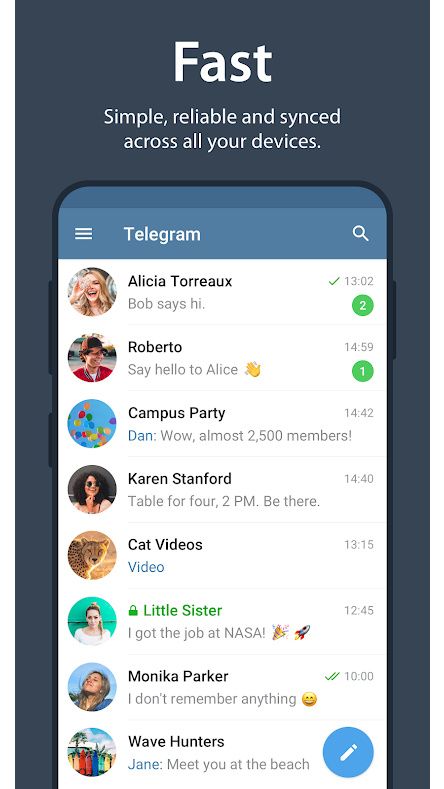

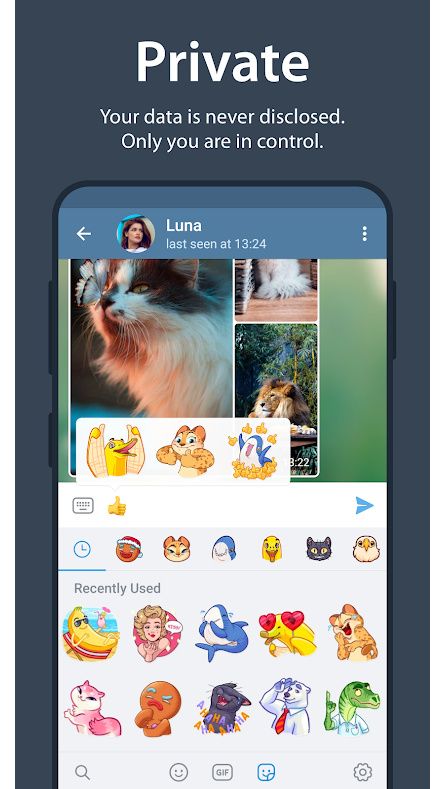
Telegram was once hailed as the ‘hail Mary’ of privacy in instant messaging, and for what it’s worth, it’s still pretty good in that respect, even though its “security” and “encryption” spots got dethroned by apps using end-to-end encryption protocols. But Telegram has started to focus more on building a whole social network experience around their concept of messaging.
Telegram has massive groups with thousands of people, channels, and communities, and even recently got an audio/video chatting experience similar to Clubhouse. Plus, it also keeps constantly adding new features to improve the user experience, features automated bots, and much more. There’s a new feature released practically every couple of weeks, and the users can’t get enough of it.
In an attempt to monetize the platform, the service has launched Telegram Premium, a subscription plan that gives users exclusive additional features, including an increased file sharing limit of up to 4GB, faster downloading speeds, access to unique stickers and emoji, animated profile picture, the ability to convert voice messages to text on the fly, and more.
Telegram (Free, Google Play) →
Best Messaging for Privacy: Signal
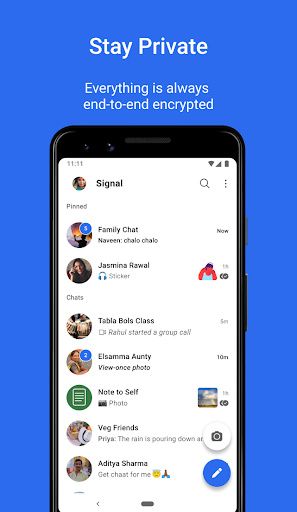

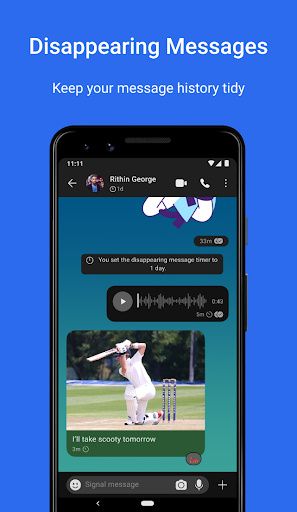
Signal is a great IM app, but it is a bit barebones in what it does, as most of its focus is on securing your privacy. In fact, WhatsApp and Signal share the same end-to-end encryption protocol, the Signal protocol (made by, you guessed it, Signal). But just because it works like WhatsApp under the hood doesn’t mean the apps are closely related at all.
While WhatsApp is backed by a big tech company (Facebook), Signal is backed by the Signal Foundation, a non-profit organization, and makes keeping your messages and personal information safe from prying eyes a big part of their marketing. It’s one of the best IM apps if you care about security as much as your privacy.
Signal Private Messenger (Free, Google Play) →
Best Messaging App for Socials Integration: Facebook Messenger

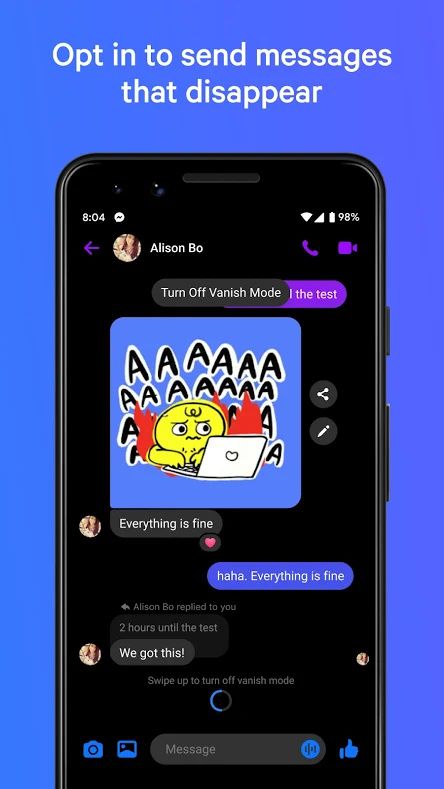
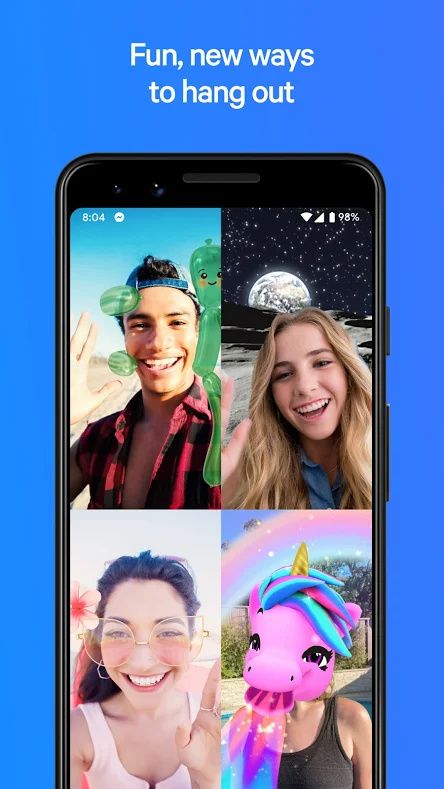
There isn’t much to the story here. Facebook Messenger started as the messaging component of Facebook in 2011, and from there, Facebook started spinning it off into its own thing. Currently, Facebook Messenger is still the messaging component of Facebook, but it can also work standalone without a Facebook account. If you wish, you can also integrate both Facebook and Instagram messaging into the same app. Given that Facebook Messenger also works with SMS, the app tries to be an all-in-one messaging hub which can either be a godsend or extremely annoying, depending on your perspective.
You should consider this app if you need to keep tabs on Facebook and Instagram messaging.
Messenger (Free, Google Play) →
Best Messaging App for Groups and Communities: Discord



Discord as a service is pretty amazing. Once launched as a gaming-focused VoIP/instant messaging service, it was meant to allow gamers to coordinate with each other over voice channels while having minimal impact on game performance. Soon, however, it started shifting away from just gaming to a more all-purpose communication service where people can hang out, talk, and have fun with each other.
If you have a group of friends, you can start your own Discord service as a hang-out place for everyone, or you can scale it up as much as you want and have servers with thousands of people, bots, several channels, and more. It’s one of the best IM apps if you’re going to focus on group messaging and communication over anything else.
Discord: Talk, Chat & Hang Out (Free, Google Play) →
Best Messaging App for Businesses: Slack
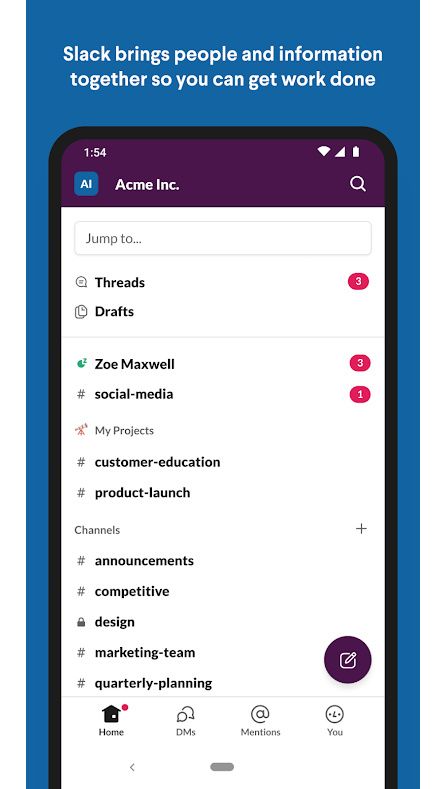
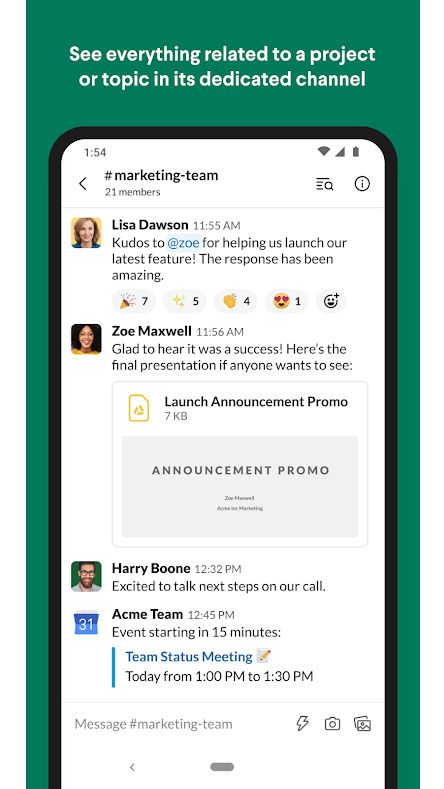
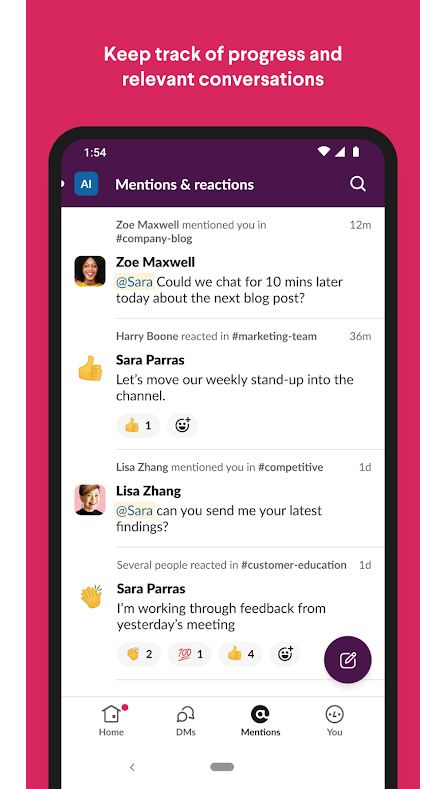
Slack is often compared to Discord, and we can clearly see why — it provides similar functionality and allows users to create separate channels for different purposes. But Slack features a lot more features that make it good for businesses over anything else. It features integrations with other services to maximize your workflow, supports bots to either automate parts of your workflow or do the stuff no one wants to do, supports message pinning, managing, and tracking documents, and even allows for sharing specific channels across multiple workspaces.
If you have a team and want to have a reliable method of communication inside your team, Slack is your best option.
Honorable Mention: Google Chat
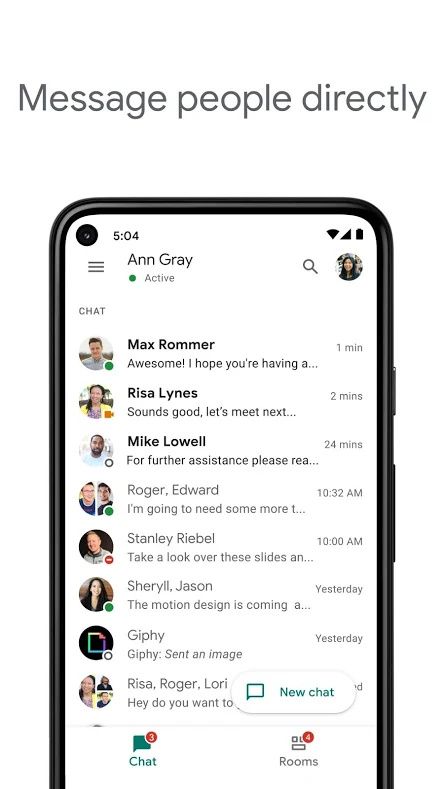

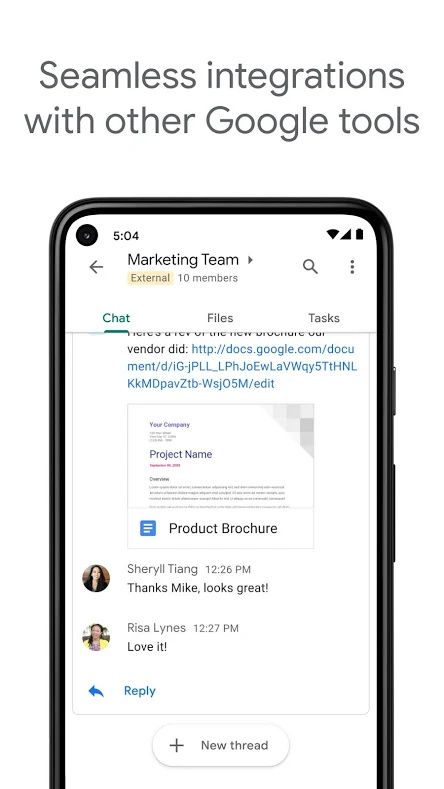
Google Chat gets an honorable mention, both because of Google’s hilariously bad history with messaging services and because it’s actually not that bad once you take a closer look at it. Google Chat was launched in 2017 as one of the two apps that form the replacement for Google Hangouts, the other one being Google Meet (which is being merged with Google Duo, yikes). You’re probably already familiar with Google Meet as a Zoom alternative, but Google Chat is meant to take care of the messaging component.
Google woes aside, however, Google Chat is meant to be good as both a one-on-one messaging service and a service for teams, similar to Slack, providing similar functionality. So if Slack isn’t your team’s cup of tea, maybe Google Chat would be a good option for you?
Google woes aside, however, Google Chat is meant to be good as both a one-on-one messaging service and a service for teams, similar to Slack, providing similar functionality. So if Slack isn’t your team’s cup of tea, maybe Google Chat would be a good option for you?
Google Chat (Free, Google Play) →
The sad truth about instant messaging services is that features and innovations play a very small role in deciding their success. For most users, familiarity, ease of use, and adoption are the deciding factors when it comes to choosing an IM service. And that’s why the best messaging app is almost always what the majority of your friends, family, and colleagues are using — even if it’s less technically superior than the rest of the competition.
If you’re looking for something where you know you’ll find most of your friends and family, then either iMessage or WhatsApp are likely one of the best options you can grab off this list. Otherwise, Telegram and Signal should be able to fit the bill pretty well in terms of privacy and security, while Discord takes the crown as the best app for groups. If you’re a business, however, Slack might be able to serve you a little bit better.
The post These are the best messaging apps: WhatsApp, Telegram, Signal, iMessage and more! appeared first on XDA.
from XDA https://ift.tt/Oj3qJM5
via IFTTT















